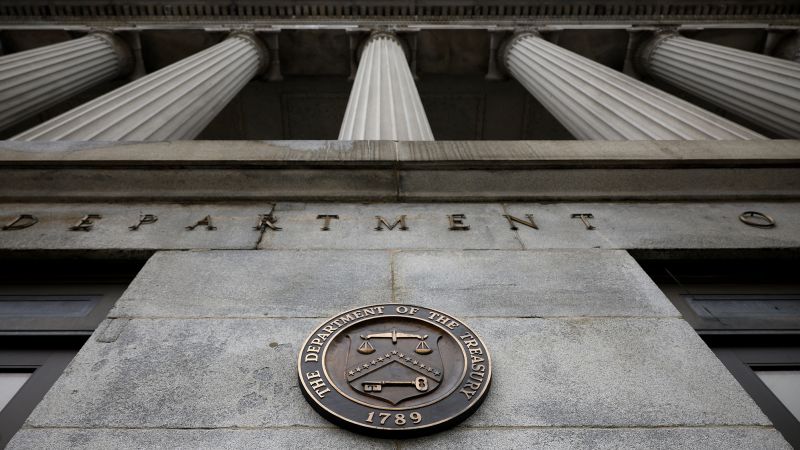Uncle Sam has quietly deployed a new secret weapon designed to catch bad guys trying to steal from taxpayers: artificial intelligence.
Starting around late 2022, the Treasury Department began using enhanced fraud-detection methods powered by AI to spot fraud, CNN has learned.
The strategy mirrors what is already being done in the private sector. Banks and payment companies are increasingly turning to AI to root out suspicious transactions — which the technology can often do with lightning speed.
Uncle Sam’s AI-fueled crackdown on fraud appears to be paying off.
Treasury’s AI-powered fraud detection recovered $375 million in fiscal 2023 alone, Treasury officials tell CNN, marking the first time Treasury is publicly acknowledging it is using AI to detect fraud.
Using these new crime-fighting strategies, the federal government can halt check fraud almost in real time, in part by looking for unusual transaction patterns, Treasury officials tell CNN. And this focus on AI has led to multiple active cases and arrests by law enforcement, Treasury said.
Treasury is not relying on generative AI, the technology powering ChatGPT and other popular tools that can create song lyrics, conjure up images and even create movie-quality videos from text prompts. Instead, Treasury officials say the type of AI they are using falls more into the bucket of machine learning and Big Data.
The goal is to move with such speed that anomalies are flagged and banks are alerted before fraudulent checks are ever cashed, Treasury officials said.
Washington needs all the help it can get on the fraud front.
Fraud spiked during the Covid-19 pandemic. US officials were under enormous pressure in 2020 and 2021 to quickly distribute aid to families and small businesses devastated by the health crisis. Fraudsters took advantage of the unprecedented flow of money from Washington.
As much as $135 billion in fraudulent Covid unemployment insurance claims were likely paid out by states, according to the US Government Accountability Office. The Small Business Administration may have distributed more than $200 billion in fraudulent Covid funds.
Check fraud has surged by 385% since the pandemic, according to Treasury. The number of suspicious activity reports filed by financial institutions nearly doubled in 2022 to more than 680,000, according to Treasury’s Financial Crimes Enforcement Network (FinCEN).
This is a particular problem for Treasury, which is among the biggest payers on the planet — if not the biggest. Last year alone Treasury dispersed 1.4 billion payments totaling $6.9 trillion, covering everything from Social Security payments to tax refunds.
“We are using the latest technological advances to enhance our fraud-detection process, and AI has allowed us to expedite the detection of fraud and recovery of tax dollars,” Deputy Treasury Secretary Wally Adeyemo said in a statement provided to CNN.
Bryan Keighery, a partner at law firm Morgan Lewis, noted that machine learning models are able to identify unusual patterns in an “almost endless supply of data.”
“A well-trained AI is capable of identifying subtle patterns and connections in data that…would be near impossible to be identified by humans,” Keighery said. “This allows financial institutions to scour through the practically infinite amount of data available to them to help identify and either stop or remediate fraud.”
News of Treasury’s use of AI comes after the Internal Revenue Service announced last September it started deploying AI to detect tax cheats.
The IRS said its experts will apply “cutting-edge machine learning technology” to examine large and complex partnership tax returns — including those of hedge funds, law firms and real estate investment firms.
Amiram Shachar, co-founder and CEO of cloud security startup Upwind, told CNN the federal government should “absolutely” use AI to detect fraud.
“AI can help humans operate more efficiently, allowing them to see more in shorter timeframes,” said Shachar. “This is especially important in the government, where there are headcount constraints. They can’t compete with Google and Facebook for the best talent.”
Shachar, whose firm recently raised funding from Penny Jar Capital, a venture firm backed by NBA superstar Steph Curry, said financial institutions are using AI to verify all major areas of transactions almost in real time.
“Once you train a model, the speed you can catch things is in milliseconds. It’s incredible,” he said.
As AI continues to evolve, the private sector is experimenting with how the technology can be used to root out fraud.
Earlier this month, Mastercard announced it built an advanced generative AI model aimed at helping banks determine whether transactions are legitimate. The payments giant said the new AI technology will be able to scan an unprecedented one trillion data points, boosting fraud-detection rates by an average of 20% and perhaps by as much as 300% in some cases.
Even as the public and private sectors turn to AI to fight crime, US officials are increasingly concerned over the risks the technology poses to the financial system.
Late last year, the Financial Stability Oversight Council, a team of leading regulators led by the Treasury secretary, for the first time formally classified AI as an “emerging vulnerability.”
Experts are especially worried about how AI can turbocharge financial fraud.
Earlier this month, a finance worker at a company was duped into paying out $25 million to fraudsters. In the elaborate scheme, Hong Kong police say the worker was tricked into thinking they were participating in a legitimate video call that was actually a deepfake video.
Read the full article here




